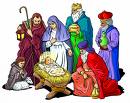 I was standing in a checkout line, doing my bit to stimulate the economy, you know, when I heard two women talking.
I was standing in a checkout line, doing my bit to stimulate the economy, you know, when I heard two women talking.
“Did you hear? Costco has told its stores — all 520 of them — not to use the word ‘Christmas’! I’m so outraged. I think my kids will grow up in a world where they never hear ‘Christmas’ except at home.”
“But don’t they hear it at school? I thought they were part of this year’s Christmas pageant?”
“No,” the first woman said, “the school is having a ‘Winter pageant’ — they refuse to say ‘Christmas,’ too. It’s as though the name of Jesus has become dirty. I mean, I’m more likely to hear swear words on the TV or radio than ‘Christmas’!”
“But what about your church? Don’t they talk about Christmas in Sunday school?”
“Oh, my, no!” the first woman said. “Jesus wasn’t born on December 25. Everyone knows that! Christmas is just a Christianized, materialistic version of the old Roman Saturnalia holiday. We’d never talk about Christmas at church. It would be wrong!”
[Note to readers: This post has been quoted almost in full in a blog at the Village Voice. I hate to report it, but they missed my intended point entirely, concluding, “From this alarming news that Sunday schools mock the birth of Christ, we might conclude that the War on Christmas is actually over, and that atheism has triumphed.”
Therefore, despite being fully cognizant of the principle “If you have to explain it, it’s not funny,” let me explain it for readers of Voice who don’t come from a conservative Protestant culture and so might miss the joke.
It’s been true for over 100 years that many churches have opposed the celebration of Christmas as the birth of Jesus. Some oppose it on historical grounds (Jesus was certainly not born in December). Some oppose any sort of special day at all, arguing that we should celebrate Jesus’ birth every day.
Even though the celebration of Christmas has lately become nearly universal in American culture, there are in fact a significant number of Christians who continue to oppose celebrating Christmas as the birth of Christ.
Now, to me, this creates a hugely fascinating irony. Here we have Christians upset with Costco for refusing to honor Christmas as the birth of Jesus, and yet there are many Christians who also refuse to honor Christmas as the birth of Jesus.
In fact, in many parts of the country, a church leader will find himself pushed by some church members to boycott Costco while other members are demanding that “Christmas” not be mentioned from the pulpit and that any children’s pageant be a “winter pageant” not a “Christmas pageant.” Ironic, isn’t it?
And so I have a lot of trouble with the notion that we should boycott Costco for doing the very same thing that many Christians do. For that matter, I’m not sure I see “boycott” anywhere in the Sermon on the Mount. I think we should turn the other cheek and do our best to cause Jesus’ name to be celebrated for the goodness he inspires rather than the fear his followers inspire in the merchandising industry.]





I fully agree with your ideas on "boycott." I tire of Christian witch hunts which only generate ill will among those we are supposed to be trying to reach with the gospel.
Grace and peace,
Tim
Boycotts fuel the preconceived ideas that Christians are hateful, arrogant hypocrites. Wouldn't it make more sense to spend our time showing people we love them?